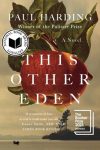
Review by Kevin Brown
Neel Mukherjee’s most recent novel, Choice, tells a triptych of tales, all tangentially related to one another and all, not surprisingly, centered around the idea of choice. The first story follows Ayush, an editor at a publishing house where the focus has shifted from books and authors to profits. He is also not merely concerned with climate change, but obsessed with it, to the point that it disrupts his relationships with his husband, Luke, and their two children. He consistently repeats, as narrator, that one must change their life, which leads him to an important decision.
The second part follows Emily, a professor at a school that might be the same one Luke works at (or this story could be a story from a collection that Ayush publishes), though that’s left unclear. Emily takes a ride share home one evening, and the driver might have hit something and/or someone, though Emily didn’t see clearly, given that she was both drunk and digging around the floor of the vehicle for her dropped phone. Rather than going to the police, though, she gets to know the driver, Salim, and learns his story and his family’s story, as they immigrated from Eritrea, leading Emily to make a radical life choice.
The final section tells the story of Sabita, a woman living on the border of West Bengal and Bangladesh, and is most likely a response one of Luke’s fellow economics professors gives to Ayush when he asks about her work on poverty. Sabita and her family receive a cow as part of an experiment to see if a change in assets can change one’s level of poverty. Unlike the other respondents in the experiment, the situation does not go well.
Ultimately, Mukherjee’s novel asks the question of how one should live in the twenty-first century, especially around how one can do good in such a complex world. Mukherjee leaves the reader with that question, as he knows there are no easy answers.
Choice by Neel Mukherjee. W.W. Norton, April 2024.
Reviewer bio: Kevin Brown has published three books of poetry: Liturgical Calendar: Poems (Wipf and Stock); A Lexicon of Lost Words (winner of the Violet Reed Haas Prize for Poetry, Snake Nation Press); and Exit Lines (Plain View Press). He also has a memoir, Another Way: Finding Faith, Then Finding It Again, and a book of scholarship, They Love to Tell the Stories: Five Contemporary Novelists Take on the Gospels. Twitter @kevinbrownwrites




